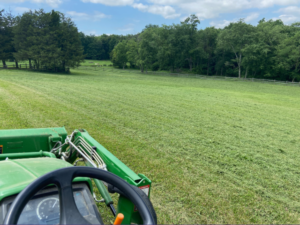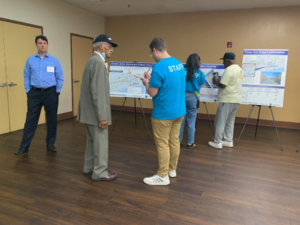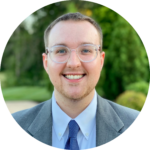26 Sep Starting a Career in Public Engagement
From the countryside to the big city, David discovered his calling to be an urban planner. Following his passions, David seeks justice and empowerment to set forth a way of planning that centers engagement from the start.
From Country Boy to City Planner

Overlooking a freshly mowed pasture on the family farm ready for horses to graze
I grew up on a horse farm in rural Cecil County, Maryland, attending Sunday church services and youth groups. Upon graduating high school in a class of 32 students, I moved to Philadelphia in 2019 as an undergraduate freshman studying at the Fox School of Business at Temple University.
At my roots, I was just a country boy. I knew little about ways of life unlike my own, yet I wanted to experience life around people free to be who they are, love who they love, and live harmoniously in tolerance of one another.
Since a young age, the city beckoned me and so did public service. I was infamously fickle with my passions. I wanted to be a firefighter – no, a teacher – no, a train engineer – no, an astronaut! Friends and their parents asked almost weekly, “David, what do you want to do when you grow up?” Each time, I was unequivocal in my answer. Yet each time, my passions shifted again. That was until I discovered urban planning.
Pandemic-era Planner
It was my second semester of University when the COVID-19 pandemic hit. While isolating like everyone else, I was able to really find myself. Like a revelation, I found urban planning through observing the world around me.
I found it in the way buildings interact with their streets (land use), how traffic flows and congests (transportation management), and how the smog over the city suddenly vanished for a few months (sustainability). These mundane realities existed before me and may outlast me. Nevertheless, we can choose to do something about them if we, collectively, can harness the power to do so. I found my calling to be an urban planner through these mundane realities during such a tumultuous time socially and politically.
I transferred from Fox to the Tyler School of Art and Architecture and majored in Community Development. With a focus in public engagement and neighborhood planning at the micro-local level, I earned my bachelor’s degree. I continued on, earning my master’s degree in City and Regional Planning with a focus in transportation, sustainability, economic development, and the role of politics in the built environment.
Planning for The People by The People

David listening and recording a community member’s comments at an open house for PennDOT in Chester, Delaware County
The very thing planners historically struggle with – public participation in decision making – is an aspect of planning I love most. The idea that everyday citizens can and should have a role in shaping the future of the places they inhabit is what I sought out, yet as a citizen, found incredibly difficult to access. Barriers like inconvenient meeting times, short public comment periods, overly technical language, and even the total lack of opportunity to give input altogether were discouraging and made it harder to get engaged. In my professional role, it’s these barriers that I work to lower, if not eradicate.
In my final year of higher education, I found Connect the Dots. Empowering everyday citizens to have a voice in the decision making process is what Connect the Dots is all about, and it’s why I decided to begin my urban planning career here.
Cities today were shaped by past, and often persisting, injustices that have resulted in disparities in public health, education, mobility, and overall quality of life. Recognizing past injustices and ongoing failures to lift up communities in processes that will impact their daily life, as planners, I believe we should center our work around public participation. My work at Connect the Dots allows me to bridge the gap between decision makers and the communities they serve. From brainstorming collaboratively to dream up a fun way to make a technical topic palatable to analyzing inputs and ensuring feedback is taken seriously and incorporated into the final result, I seek to center public participation in planning.
For aspiring planners and veteran planners alike, I encourage your optimism, your creativity, and your determination. As you are experts in planning principles, theory, and processes, community members are experts in their lived experiences and offer insights into crucial details that benefit our work. Join me in considering how our work can center public participation from the project’s onset and throughout its duration. Let’s work together to lift up the voices of the hardest-to-reach and incorporate their input into the final outcome. Together as planners, our profession can chart a new way forward that works to address past failures and does it better to prevent future ones.

David is a highly educated Associate at Connect the Dots, providing valuable internal and external process development and support across client projects. He has a Bachelor’s degree in Community Development and a Master’s degree in City & Regional Planning. Having executive volunteer positions in community groups, David aims to empower others in decision-making processes and foster relationships. He utilizes his communication, facilitation, planning, design, and team-building skills to ensure successful engagement strategies. As a project associate, David supports team members in projects at multiple levels including engagement strategy preparation, outreach, facilitation, data collection and analysis, document creation, and reporting.
